China
Population: 1.3 Billion
Capital: Beijing
Time Zone: GMT +8
Part of 2006 World Trip, arriving from Hong Kong and going on to Laos.
Travelling through the beautiful south west of China was a great way to see this country at its best.
Use the navigation bar on the left or the map-links to select a place. Alternatively scroll down to see all the entries. Click on photos to enlarge. See all China photos here.
My travels in China started by catching a train from Hong Kong to Guangzhou. This was my first experience of travelling in a country where English was not so commonly spoken; I had spent a few months learning Mandarin before I left, however this had given way to Japanese when it was confirmed I would soon be working there, and hence I felt a little under prepared. I did, however, have enough basics to be polite and, being from the UK, I am lucky there are always people who want to practice English. In Guangzhou I had a few hours before my train and, not yet confident with local buses, got a taxi to a bank. I was pleased I managed the process of getting money out using my faulting Mandarin, and then headed back to the main station. The station was large and somewhat overwhelming, but after looking lost for a while a student helped me find the right platform so I could catch a night train to Nanning. At the station I met a girl who was travelling from Hong Kong to Hanoi via Nanning, and who was also a bit lost, having just been told the right place to go I was able to help and it was then nice to have someone to talk to on the train. The train was modern and very comfortable, and the railway line was new as well, so the journey was fast and smooth. I think this is probably the only time I have ever really been able to sleep on a night train.
Nanning
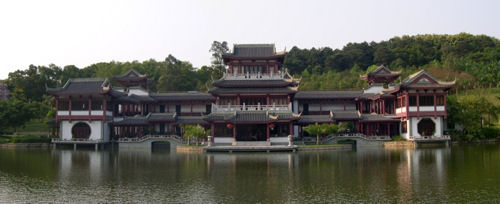 At Nanning I had a breakfast of Chinese dumplings from the station stall and was about to start looking for a place to stay the skies opened and the city was bombarded with torrential rain. I waited for a while, watching gallons of water pour off the roof into a small bucket buts after a few minutes I realised the rain was going to carry on for a while and so, not wanting to waste the day, I headed off into the downpour. This gave me to opportunity to test the umbrella I had bought for travelling which proved very effective. I found a cheap hotel and after some pointing at the phrase book was able to get a room. After dumping my rucksack, I headed out to explore, and was lucky that the rain soon stopped and the skies brightened up. Nanning is renowned for being humid but the rain had temporarily freshened the air making it feel very pleasant. Following my guidebook, I walked through the centre of the town and down to the river.
At Nanning I had a breakfast of Chinese dumplings from the station stall and was about to start looking for a place to stay the skies opened and the city was bombarded with torrential rain. I waited for a while, watching gallons of water pour off the roof into a small bucket buts after a few minutes I realised the rain was going to carry on for a while and so, not wanting to waste the day, I headed off into the downpour. This gave me to opportunity to test the umbrella I had bought for travelling which proved very effective. I found a cheap hotel and after some pointing at the phrase book was able to get a room. After dumping my rucksack, I headed out to explore, and was lucky that the rain soon stopped and the skies brightened up. Nanning is renowned for being humid but the rain had temporarily freshened the air making it feel very pleasant. Following my guidebook, I walked through the centre of the town and down to the river.
 What struck me most was just how modern everything was. New buildings, roads, everything seemed new. Down by the river there were some old boats and tattered buildings - development had not quite reached this far yet - but everything else was new or an active building site. What I learned later was that the Chinese stock market was extremely volatile at this time, and this, coupled with the government controls, made property one of the only sound investment for companies. Apparently, many of the buildings I saw here and in Kunming were probably still empty, waiting for a middle-class China to develop and fill the vacant rooms.
What struck me most was just how modern everything was. New buildings, roads, everything seemed new. Down by the river there were some old boats and tattered buildings - development had not quite reached this far yet - but everything else was new or an active building site. What I learned later was that the Chinese stock market was extremely volatile at this time, and this, coupled with the government controls, made property one of the only sound investment for companies. Apparently, many of the buildings I saw here and in Kunming were probably still empty, waiting for a middle-class China to develop and fill the vacant rooms.
This seemed to be a general truth; at the time China had a growing middle class which were moving from the villages into these newly created modern cities, it might have been more the change of culture but it did feel a little like people were still adjusting to the idea of living in cities. It also surprised me to find that China was still a spitting culture and it took a while to get used to, although having been travelling for a month in India before this, I was mostly adjusted.
One aspect I particularly liked about the Chinese cities I visited were the cloths shops. These sold cheap and fashionable cloths and would pump Techno music into the street. Sometimes there would also be Break Dances as well, and so would draw crowds of young people, giving the areas a nice party atmosphere. Nanning city centre had many nice-looking cafes, but they all required you to go to a window and order you food. Still not knowing the words for what I wanted and unable to point to a menu I weakened on this occasion and went to KFC.
In the afternoon I caught a bus (the right way on my second attempt) to the Qing Xiu Shana park on the outskirts of Nanning. This is a really great place with several temples, a lake and a range of different gardens all set within sprawling woodland. There is also the longest bamboo sheltered walkway in the world - quite an obscure claim to fame but I was impressed and walked the whole length twice to get value for money. That evening I decided to be a little more adventurous and ate in a little cafe in a street behind the hotel.
 The people were friendly and after some general smiling and nodding I got some reasonable food. I perfected conversations via the medium of smiling and laughing throughout my travels; an art form through which you can communicate most things as long as you are happy to eat anything once. This was all good practice for my life in Japan where the first year was a lot of say 'yes' to everything and then see how the situations panned out - frequent well or at least memorable.
The people were friendly and after some general smiling and nodding I got some reasonable food. I perfected conversations via the medium of smiling and laughing throughout my travels; an art form through which you can communicate most things as long as you are happy to eat anything once. This was all good practice for my life in Japan where the first year was a lot of say 'yes' to everything and then see how the situations panned out - frequent well or at least memorable.
The following day I wandered the squares of Nanning city centre, watching the older people ballroom dancing, playing chess or gambling. This was a lovely atmosphere, a quaint reminder of times passed - throughout China I sometimes had to remind myself that the older generation have lived through some very challenging times, and so it is nice to see them enjoying life. That evening I caught another overnight train up to the city of Kunming.
Kunming
 This train ride was again good, although the train itself was somewhat older than the one I had taken to Nanning. After finding my bed and introducing myself in Chinese to the people in my surrounding bunks and them reciprocating in English (the trains are set out in berths, each containing two 3-level bunk beds) I ran out of Mandarin and the conversation dried up so I went and sat at the little table by the window. I was shortly joined by a Chinese man of similar age to me who worked in an electronics factory in Kunming. He had been to university and spoke good English. We talked about our countries and I learned a lot about his views on modern day China, and the amazing level of expansion the country was currently undergoing. Whilst we were taking, I was watching some of the most spectacular scenery in the world pass me by. Later I would see more pictures and really wish I had stopped here - I had considered an extra stopover but decided against it due to time, something I regretted, but there is always next time.
This train ride was again good, although the train itself was somewhat older than the one I had taken to Nanning. After finding my bed and introducing myself in Chinese to the people in my surrounding bunks and them reciprocating in English (the trains are set out in berths, each containing two 3-level bunk beds) I ran out of Mandarin and the conversation dried up so I went and sat at the little table by the window. I was shortly joined by a Chinese man of similar age to me who worked in an electronics factory in Kunming. He had been to university and spoke good English. We talked about our countries and I learned a lot about his views on modern day China, and the amazing level of expansion the country was currently undergoing. Whilst we were taking, I was watching some of the most spectacular scenery in the world pass me by. Later I would see more pictures and really wish I had stopped here - I had considered an extra stopover but decided against it due to time, something I regretted, but there is always next time.
On the first overnight train I had noticed that boiling water was provided for the passengers so they could brew tea and make pot noodle dinners. I thought this was a great idea, so for the ride to Kunming I was prepared with a king size pot noodle and a set of children's chop sticks (I didn't know these were provided in the box and wanted a cheap plastic set). On the previous train the water had been provided through taps at the ends of the carriages, however in this train the guard filled small vats and then everyone took this water and put it in smaller containers in the bunk areas. I was a bit late in looking for water and so this meant there was no hot water to be found by the time I got there. After my third carriage I met an English girl travelling the other way, also with a pot noodle in hand. Together we continued a full search of the whole train and concluded that the water had all been used. Returning to my carriage we explained this predicament to one of the people I had had a faltering conversation with at the start of the train ride who at once disappeared and somehow returned with a flask of boiling water. It was again nice to be able to chat to someone from the UK and she boosted my confidence by saying she still had trouble ordering food, even after studying Chinese in Beijing for a few months. She introduced me to the word 'Jiga' meaning 'that one' which she used when pointing to menus or after running around a restaurant pointing to peoples dishes, a technique with I adopted for myself from then on and made meal times considerably easier.
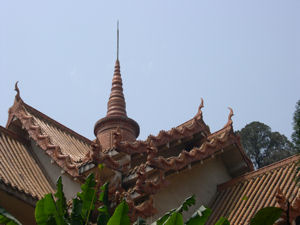 The next morning, we went to the only place in Kunming for budget travellers - the Youth Hostel. This was a very clean place near the centre of town that was packed with backpackers. I knew I would be returning to Kunming in a week so opted to head straight out into the hills for some walking. Armed with my printed Kunming page of the Lonely Planet, I manage to negotiate my way down to the lake at the south of the city using several busses. I was quite proud of this feat as it showed I was starting to be able to negotiate in a world where the written language was impossible for me to read, although luckily for me China had opted to use western numbers for the most part. It was a Sunday and the sun was shining when I got to the lake, and it felt like I was joined by a fair percentage of the city's population, walking, cycling or just enjoying the sun. I started to walk up the trail from the lake and a group of local women got very excited when I started covering myself in sun cream, coming over and asking for some as well. I am not really sure why this was a novelty to them but was happy to play along then continued up the trail. The most famous part of the area is known as the stone forest, large formations of igneous rock covering an entire hillside. The area is very popular and there was even a cable car up to the temple on the hilltop for those not wishing to walk - Kunming is a rich city, I would later learn that this is because it is in the heart of a large tobacco growing area and smoking is a big thing in China. I had an interesting lunch at a small street vender by the lakeside; he had large slabs of cold noodles of various varieties and would grate these into normal noodles or dice them into blocks. This was served cold with a selection of herbs and chilli. Feeling I had done my cultural bit for the day I then had an ice cream before heading back to the Youth Hostel. This took longer than the way out and after a while, as the bus wandered the back streets of Kunming, I started to worry that I had gone the wrong way, however after an hour we finally reached an area I recognised and so I jumped off and walked the last part of the trip somewhat relieved. The following day I caught the early morning express bus up to Lijiang.
The next morning, we went to the only place in Kunming for budget travellers - the Youth Hostel. This was a very clean place near the centre of town that was packed with backpackers. I knew I would be returning to Kunming in a week so opted to head straight out into the hills for some walking. Armed with my printed Kunming page of the Lonely Planet, I manage to negotiate my way down to the lake at the south of the city using several busses. I was quite proud of this feat as it showed I was starting to be able to negotiate in a world where the written language was impossible for me to read, although luckily for me China had opted to use western numbers for the most part. It was a Sunday and the sun was shining when I got to the lake, and it felt like I was joined by a fair percentage of the city's population, walking, cycling or just enjoying the sun. I started to walk up the trail from the lake and a group of local women got very excited when I started covering myself in sun cream, coming over and asking for some as well. I am not really sure why this was a novelty to them but was happy to play along then continued up the trail. The most famous part of the area is known as the stone forest, large formations of igneous rock covering an entire hillside. The area is very popular and there was even a cable car up to the temple on the hilltop for those not wishing to walk - Kunming is a rich city, I would later learn that this is because it is in the heart of a large tobacco growing area and smoking is a big thing in China. I had an interesting lunch at a small street vender by the lakeside; he had large slabs of cold noodles of various varieties and would grate these into normal noodles or dice them into blocks. This was served cold with a selection of herbs and chilli. Feeling I had done my cultural bit for the day I then had an ice cream before heading back to the Youth Hostel. This took longer than the way out and after a while, as the bus wandered the back streets of Kunming, I started to worry that I had gone the wrong way, however after an hour we finally reached an area I recognised and so I jumped off and walked the last part of the trip somewhat relieved. The following day I caught the early morning express bus up to Lijiang.
Lijiang
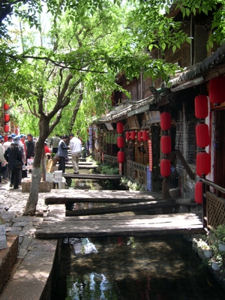 Lijiang is a wonderful place; surrounded by mountains it is famous for its old town area, which is made in a traditional style and a UNESCO Heritage Site. As with all good things, it is a tourist hot spot, and is a very popular place for Chinese people to go on holiday. This means that all the of the building of the old town are now bars, cafes, restaurants or shops selling the usual tourist paraphernalia. Although you could hardly say the town was traditional in that light, the architecture and buildings have been preserved well and it still has a really nice character. The town itself has many small waterways filled with gold fish and small bridges provide access most of the houses and spending time walking around the narrow streets was a really enjoyable and relaxed.
Lijiang is a wonderful place; surrounded by mountains it is famous for its old town area, which is made in a traditional style and a UNESCO Heritage Site. As with all good things, it is a tourist hot spot, and is a very popular place for Chinese people to go on holiday. This means that all the of the building of the old town are now bars, cafes, restaurants or shops selling the usual tourist paraphernalia. Although you could hardly say the town was traditional in that light, the architecture and buildings have been preserved well and it still has a really nice character. The town itself has many small waterways filled with gold fish and small bridges provide access most of the houses and spending time walking around the narrow streets was a really enjoyable and relaxed.
Lijiang is home to the Naxi people, a small ethic minority with an interesting traditional form of dress and song. Every evening outside the bars young people would be dressed in the traditional style and sing the traditional songs to try to entice the crowds of Chinese holiday makers. Each bar tried to outdo its neighbour so there was a great atmosphere in the old-town centre. On my first evening I met a guy in the youth hostel who had lived in China for many years and taught me the phrase 'dor shaw', 'how much?', another very useful phrase since bartering is required for nearly everything. He could speak good Chinese and took me to a cafe where we had a really nice noodle soup followed by a beer on the youth hostel balcony as we watch the sun set over the mountains and town.
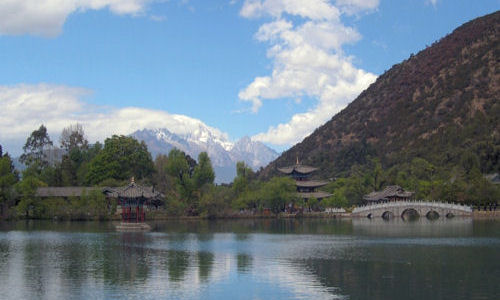
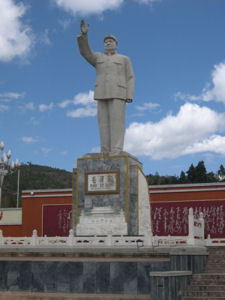
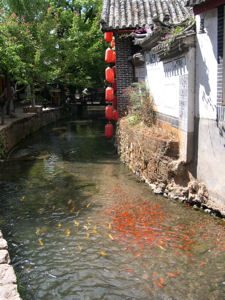 The following day I wandered the town admired the views. For lunch I opted to try to order the same thing I had eaten the day before. Unfortunately, my Chinese still being quite lacking, I ended up with a very nasty smelling broth filled with odd bits of meat. I was informed later that it might have been dog and I would not have been surprised, I am happy to try most things once but could not finish this one.
The following day I wandered the town admired the views. For lunch I opted to try to order the same thing I had eaten the day before. Unfortunately, my Chinese still being quite lacking, I ended up with a very nasty smelling broth filled with odd bits of meat. I was informed later that it might have been dog and I would not have been surprised, I am happy to try most things once but could not finish this one.
The town had a large statue of Mao Ze Dong. Not overly hot on my history I had assumed that after instigating the Great Leap Forward and the Cultural Revolution, in time his statues would have been removed. I now know that his statue is very common and it is felt that Mao was 70% correct in the things he did. This seems a little strange at first but when you travel the countryside in China and see the people in the villages all working in the fields and building houses together it is easy to see how a communist system, and Mao's ideas could have worked.
In the afternoon I visited the most famous area of Lijiang, the Black Dragon Pool - a really beautiful spot that I have seen photos of in travel agent windows in all the countries I have lived in. Gardens, a small river, and a number of temples surround the pool itself and I spent the afternoon wandering around the grounds and visiting the temples. There is also a steep hill with a number of temples on the top that I climbed to get a better view of the Snow Mountain, the other side of which I would be travelling to the following day to start my trek through the Tiger Leaping Gorge.
Tiger Leaping Gorge
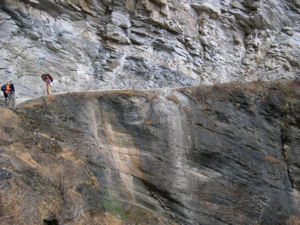 Bus stations in China are somewhat confusing for an inexperienced traveller. There are long-distance, express and local varieties; all situated in different parts of the town or somewhere on the outskirts, and often built or moved recently making my guidebook out of date. And so, after getting up early, putting my rucksack into storage and buying some basic supplies I then spent much of the morning traipsing around Lijiang trying to find the right bus station. After another unsuccessful attempt I popped into an expensive hotel (the best place to find English speaking people) to ask for directions. To my surprise the Clark took me outside, flagged down the correct bus, asked the driver to let me off at the right stop and even paid the fare! Very nice of him and shows the kindness that I received all throughout all of my travels. All this messing around meant I arrived at the start of the Tiger Leaping Gorge trek just after lunch, somewhat later than is recommended for the first day. There are only a few places to stay along the trek and the going would be challenging after dark so I set off at a fast pace to try to recover some lost time, please I had left my big rucksack back in Lijiang.
Bus stations in China are somewhat confusing for an inexperienced traveller. There are long-distance, express and local varieties; all situated in different parts of the town or somewhere on the outskirts, and often built or moved recently making my guidebook out of date. And so, after getting up early, putting my rucksack into storage and buying some basic supplies I then spent much of the morning traipsing around Lijiang trying to find the right bus station. After another unsuccessful attempt I popped into an expensive hotel (the best place to find English speaking people) to ask for directions. To my surprise the Clark took me outside, flagged down the correct bus, asked the driver to let me off at the right stop and even paid the fare! Very nice of him and shows the kindness that I received all throughout all of my travels. All this messing around meant I arrived at the start of the Tiger Leaping Gorge trek just after lunch, somewhat later than is recommended for the first day. There are only a few places to stay along the trek and the going would be challenging after dark so I set off at a fast pace to try to recover some lost time, please I had left my big rucksack back in Lijiang.
The first part of the trek is not overly interesting, as you climb along the hillside towards the mountain tops, and so I was able to make good progress. Mid-afternoon I met a group of three ladies, Julie an American visiting her Chinese cousin, Achu, and Barbara, a Swedish woman who has live just about everywhere on Earth. This was a great chance meeting as Julie spoke Mandarin and Achu spoke both Mandarin and Cantonese and between them they sorted lots of things out for Barbara and myself over the next few days and made the trip a much easier and richer experience.
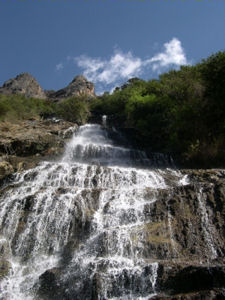 After the initial climb, the scenery grows ever more spectacular as you walk into the gorge itself, with snow-capped mountains on either side and the raging Yangtze River below. The path is well maintained, even though it is often clinging to the cliff face, making walking easy, and so we walked about half way through the gorge that afternoon. We stopped for the night at a guesthouse with a stunning view of the Snow Mountain. My fellow travellers ordered some excellent food and we chatted with a Chinese guy who had live in America for a time; much of what I have learned about China came from these conversations.
After the initial climb, the scenery grows ever more spectacular as you walk into the gorge itself, with snow-capped mountains on either side and the raging Yangtze River below. The path is well maintained, even though it is often clinging to the cliff face, making walking easy, and so we walked about half way through the gorge that afternoon. We stopped for the night at a guesthouse with a stunning view of the Snow Mountain. My fellow travellers ordered some excellent food and we chatted with a Chinese guy who had live in America for a time; much of what I have learned about China came from these conversations.
The following day the scenery continued to improve with several impressive waterfalls crossing our path. The people on the trail know a business opportunity when they see one and there was a charge at the best viewpoint of the stone supposedly jumped by the tiger, as well as to use the path that dropped right down to the river. The four of us were of a similar mind that we did not want to pay a surcharge for walking and so we continued on the normal route and found a sheep track down to the river instead. While the nights in the mountains are cold, the shelter of the gorge along with bright sunshine made conditions hot going - especially climbing back up the steep path from the river - and I was glad to reach our lunch spot for rest and a cold beer. From here we had to walk quite a few more miles along a road and then get a ferry to collect a bus back to Lijiang. It was already afternoon and there was some confusion as to whether the ferry was running at all and at what time the last bus left. After another hour walking along the road, and feeling like we were not making much progress we though it better to try to hitch back to the start of the trail and get a bus from there.
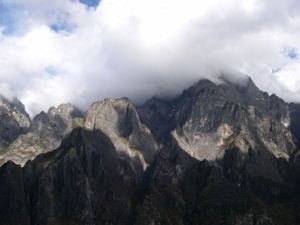
This proved difficult with the absence of traffic, but when a car finally materialised the girls managed to flagged it down. After 15 minutes of complex negotiations, and creating a traffic jam on the road that had been silent half an hour before, they succeeded in organising a taxi ride all the way back to Lijiang saving us a lot of effort.
It is fair to say that with native speakers ordering the food, the meals I had over the next two days were the best I had in China - probably the cheapest as well with Achu spending the first 10 minutes in animated argument with the owners to get the best price before each meal. I tried water buffalo hot pot and learned the useful phrase 'hun la' meaning 'very hot'. In the days I wandered the streets of the old town and enjoyed the scenery and atmosphere. After Lijiang I caught the bus back to Kunming and spent another day wandering the centre and temples before making my way south to Jinghong.
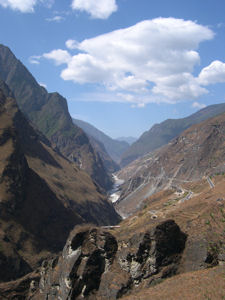 Things in China are done on a large scale. The road from Kunming to Lijiang, for example, is a 6-lane expressway that carries a few busses and the odd truck. It appears a similar road was also being built down toward the Laos boarder. I suspect the building description was to make a road in a straight line and at constant elevation because much of it consisted of bridges, tunnels and cuttings. While it is a shame to see such colossal building works through pristine countryside, I welcomed the roads completion as my night bus slowly bounced and meandered its way south on the old road network and, unable to sleep, I just lay and watching mile after mile of construction work. The bus had an odd arrangement where everyone had a bed, but they were not flat, making the option of sleep all the more challenging, having skipped night's sleep before on this trip I was not too concerned but this was to be the start of a very long day. Pulling into Jinghong bus station around 4 am I had my first experience of the true south East Asian heat and humidity. In the darkness I gathered up my rucksack and consulted my small printout map (having only a few weeks in China I had opted to photocopy relevant pages rather than carry the somewhat cumbersome guide itself). This indicated that the place I planned to stay was about a kilometre to the south, just off the road I was on, and so with a glance at my trusty compass, I set off into the sticky blackness. After a few kilometres it became apparent that the lights I was heading for were not Jinghong central but a small village in the distance. Retracing my steps, I discovered that again I had been dropped at a new out-of-town express bus station, not shown on my map, instead of the long-distance station (also on the same road). When I finally reached the guesthouse, it was only just dawn and no one was around, I dozed for a while until a fellow Englishman, James, joined me. After some time, a woman appeared and we attempted to get a room for the night - here in the south the Chinese dialect is different and we found it very hard to communicate anything, even James who had good Chinese.
Things in China are done on a large scale. The road from Kunming to Lijiang, for example, is a 6-lane expressway that carries a few busses and the odd truck. It appears a similar road was also being built down toward the Laos boarder. I suspect the building description was to make a road in a straight line and at constant elevation because much of it consisted of bridges, tunnels and cuttings. While it is a shame to see such colossal building works through pristine countryside, I welcomed the roads completion as my night bus slowly bounced and meandered its way south on the old road network and, unable to sleep, I just lay and watching mile after mile of construction work. The bus had an odd arrangement where everyone had a bed, but they were not flat, making the option of sleep all the more challenging, having skipped night's sleep before on this trip I was not too concerned but this was to be the start of a very long day. Pulling into Jinghong bus station around 4 am I had my first experience of the true south East Asian heat and humidity. In the darkness I gathered up my rucksack and consulted my small printout map (having only a few weeks in China I had opted to photocopy relevant pages rather than carry the somewhat cumbersome guide itself). This indicated that the place I planned to stay was about a kilometre to the south, just off the road I was on, and so with a glance at my trusty compass, I set off into the sticky blackness. After a few kilometres it became apparent that the lights I was heading for were not Jinghong central but a small village in the distance. Retracing my steps, I discovered that again I had been dropped at a new out-of-town express bus station, not shown on my map, instead of the long-distance station (also on the same road). When I finally reached the guesthouse, it was only just dawn and no one was around, I dozed for a while until a fellow Englishman, James, joined me. After some time, a woman appeared and we attempted to get a room for the night - here in the south the Chinese dialect is different and we found it very hard to communicate anything, even James who had good Chinese.
Jinghong
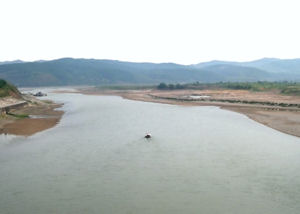 It was the day after the Luna New Year which is celebrated in both Laos and the south west of China and so the prices were raised and most rooms full. I had planned to be in Jinghong for the celebrations but, unfortunately, was too late in reserving a seat and so missed it by a day - I later saw photos of the festival where the whole town spends the day having a huge water fight, something which would have been great to experience. Not wanting to pay the excess price we headed over town to another guesthouse but this was full. After breakfast we weighed up the options and, having assessed that there was nothing much to do in the town, we headed to the local bus station to continue on our journeys. James got a ticket to where he was going (I would subsequently bump into him a few days later in Laos; Laos is that sort of place) but I wasn't so lucky - everyone was going home and all the busses were full. I headed back to the first guesthouse and after a lengthily phrase book conversation ascertained that there were now no beds available. Feeling a little worse for wear I headed back across town again and this time (thankfully) I was lucky and got a room and a reasonable price. After some much-needed rest I looked around Jinghong and got my first look at the mighty Mekong River, which I would loosely follow for the next few weeks. That afternoon I planned my Laos trip and then had a nice meal and a beer in the local foreigner's cafe, then went and had a long sleep to recover from the day and prepare for the next part of my trip towards the Laos border.
It was the day after the Luna New Year which is celebrated in both Laos and the south west of China and so the prices were raised and most rooms full. I had planned to be in Jinghong for the celebrations but, unfortunately, was too late in reserving a seat and so missed it by a day - I later saw photos of the festival where the whole town spends the day having a huge water fight, something which would have been great to experience. Not wanting to pay the excess price we headed over town to another guesthouse but this was full. After breakfast we weighed up the options and, having assessed that there was nothing much to do in the town, we headed to the local bus station to continue on our journeys. James got a ticket to where he was going (I would subsequently bump into him a few days later in Laos; Laos is that sort of place) but I wasn't so lucky - everyone was going home and all the busses were full. I headed back to the first guesthouse and after a lengthily phrase book conversation ascertained that there were now no beds available. Feeling a little worse for wear I headed back across town again and this time (thankfully) I was lucky and got a room and a reasonable price. After some much-needed rest I looked around Jinghong and got my first look at the mighty Mekong River, which I would loosely follow for the next few weeks. That afternoon I planned my Laos trip and then had a nice meal and a beer in the local foreigner's cafe, then went and had a long sleep to recover from the day and prepare for the next part of my trip towards the Laos border.
The next day I caught a mini bus to a small town called Mengla. Due to people returning home from the Luna New Year celebrations the roads were packed, and so there were massive hold ups everywhere, making the journey very slow. At the start of the bus ride a man placed two large boxes of eggs on the floor next to me, by the end of the trip these had all hatched into chicks, I am not sure if he planned this, but he did not seem surprised and even gave one of the chicks to a small boy. The festivities from new year were still fresh and in the front seats of the bus were two girls who had high-power super-soakers and throughout the day soaking everyone travelling the other way. All together this was by far and away the most memorable bus journey, as well as probably the slowest but I was finally dropped off in Mengla late afternoon. Mengla is an interesting town near the Laos border which seems to specialise in expensive stereos, flat screen televisions and clinics - from the street I could see rows of people on IV drips. I was not quite sure what to make of this but after many conversations later we came to the conclusion that there was possibly a lucrative drug trade passing this way to account for the goods and probably quite a bit of Malaria to account for the clinics. The weather was very hot and humid and I spent a sticky night in a stuffy room next to a common area where people were loudly gambling all night. I was hence pretty drained by morning and glad to get back outside for some air. This was the final day of my slow journey south and by lunchtime I finally made it to the border with Laos.